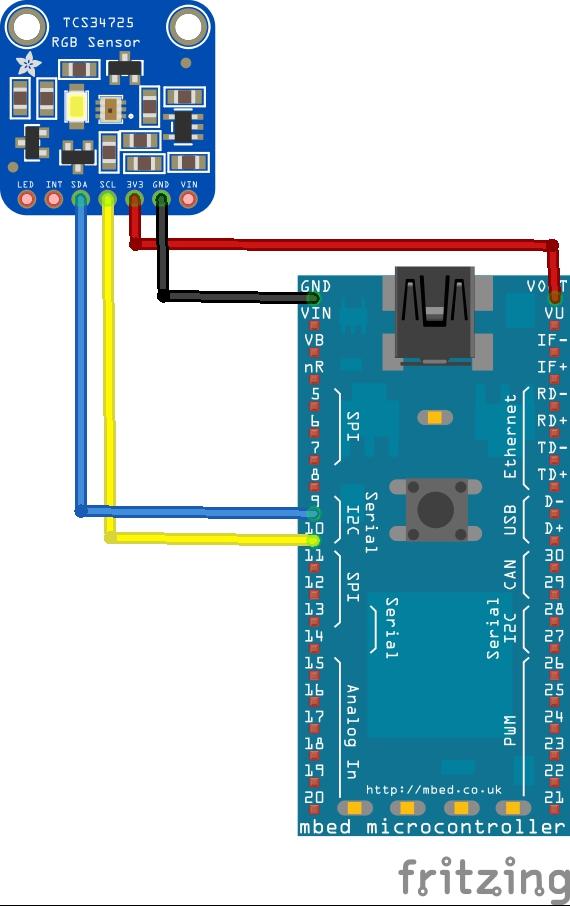In this example we connect a TCS34725 Color sensor to an MBed 1768, lets look at some details about this sensor first
The TCS34725 device provides a digital return of red, green, blue (RGB), and clear light sensing values. An IR blocking filter, integrated on-chip and localized to the color sensing photodiodes, minimizes the IR spectral component of the incoming light and allows color measurements to be made accurately.
The high sensitivity, wide dynamic range, and IR blocking filter make the TCS3472 an ideal color sensor solution for use under varying lighting conditions and through attenuating materials. This data is transferred via an I2C to the host.
- Minimizes IR and UV spectral component effects to produce accurate color measurement
- Enables accurate color and ambient light sensing under varying lighting conditions
- Minimizes motion / transient errors
- Clear-Channel provides a reference allows for isolation of color content
Parts List
| Label | Part Type | Properties |
|---|---|---|
| MBED1 | mbed | Mbed 1768 |
| Part1 | Adafruit TCS34725 RGB Color Sensor |
Layout
Code
This example uses the https://os.mbed.com/components/Adafruit-TCS34725-RGB-Color-Sensor/
[codesyntax lang=”cpp”]
#include "mbed.h"
I2C i2c(p9, p10); //pins for I2C communication (SDA, SCL)
Serial pc(USBTX, USBRX);
int sensor_addr = 41 << 1;
int main() {
pc.baud(9600);
// Connect to the Color sensor and verify whether we connected to the correct sensor.
i2c.frequency(200000);
char id_regval[1] = {146};
char data[1] = {0};
i2c.write(sensor_addr,id_regval,1, true);
i2c.read(sensor_addr,data,1,false);
// Initialize color sensor
char timing_register[2] = {129,0};
i2c.write(sensor_addr,timing_register,2,false);
char control_register[2] = {143,0};
i2c.write(sensor_addr,control_register,2,false);
char enable_register[2] = {128,3};
i2c.write(sensor_addr,enable_register,2,false);
// Read data from color sensor (Clear/Red/Green/Blue)
while (true) {
char clear_reg[1] = {148};
char clear_data[2] = {0,0};
i2c.write(sensor_addr,clear_reg,1, true);
i2c.read(sensor_addr,clear_data,2, false);
int clear_value = ((int)clear_data[1] << 8) | clear_data[0];
char red_reg[1] = {150};
char red_data[2] = {0,0};
i2c.write(sensor_addr,red_reg,1, true);
i2c.read(sensor_addr,red_data,2, false);
int red_value = ((int)red_data[1] << 8) | red_data[0];
char green_reg[1] = {152};
char green_data[2] = {0,0};
i2c.write(sensor_addr,green_reg,1, true);
i2c.read(sensor_addr,green_data,2, false);
int green_value = ((int)green_data[1] << 8) | green_data[0];
char blue_reg[1] = {154};
char blue_data[2] = {0,0};
i2c.write(sensor_addr,blue_reg,1, true);
i2c.read(sensor_addr,blue_data,2, false);
int blue_value = ((int)blue_data[1] << 8) | blue_data[0];
// print sensor readings
pc.printf("Clear (%d), Red (%d), Green (%d), Blue (%d)\r\n", clear_value, red_value, green_value, blue_value);
wait(0.5);
}
}
[/codesyntax]
Testing
Using a terminal program such as TeraTerm you should see something like this
Clear (4248), Red (2551), Green (2133), Blue (1913)
Clear (3323), Red (1739), Green (1630), Blue (1458)
Clear (3323), Red (1739), Green (1630), Blue (1458)
Clear (4069), Red (3035), Green (2304), Blue (2184)
Clear (4124), Red (3078), Green (2338), Blue (2215)
Clear (4133), Red (3084), Green (2341), Blue (2218)
Clear (4235), Red (3128), Green (2390), Blue (2244)
Clear (5749), Red (2732), Green (2673), Blue (1664)
Clear (4989), Red (3010), Green (2574), Blue (2025)
Clear (4112), Red (3071), Green (2331), Blue (2210)
Clear (4112), Red (3071), Green (2331), Blue (2210)
Clear (2820), Red (2077), Green (1557), Blue (1474)
Clear (424), Red (275), Green (206), Blue (162)
Clear (409), Red (267), Green (202), Blue (160)
Clear (1167), Red (841), Green (634), Blue (578)
Clear (4342), Red (3158), Green (2387), Blue (2233)
Clear (6270), Red (3737), Green (3013), Blue (2516)
Clear (4007), Red (2979), Green (2250), Blue (2132)
Link
1PCS CJMCU-34725 TCS34725 Color Sensor RGB color sensor development board module


